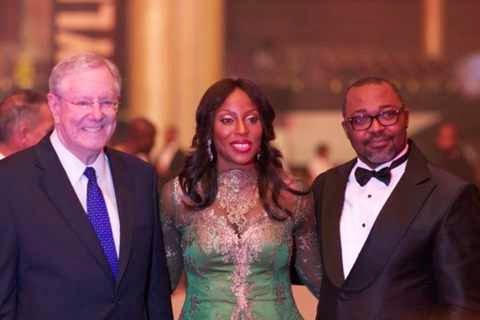 |
| Steve Forbes at the launch of new African TV channel |
The United States of Africa is the 10th largest economy in the world. It is ahead of China and India, countries with populations to match Africa's just over a billion people. Its booming consumer market is worth almost a trillion dollars a year but international companies struggle to tap into it.
Africa still suffers from the illusion that it's a difficult place to do business, a dark continent of war, famine and corruption. This short-sighted and misinformed belief has put companies that are just awakening to the economic miracle of Africa, at a disadvantage.
Instead, it is an awakening consumer giant with a growing middle class eager to show off their new-found economic and social status through the purchase of branded goods. On average, 40% of the population of any given African country belongs to what Vijay Mahajan, author of Africa Rising: How 900 Million Consumers Offer More Than You Think, describes as Africa 1 and Africa 2. These are the elite of the population and the growing aspirant middle class.
These are the people who are driving the market for consumer goods, the Africans who told researchers for the Boston Consulting Group they were planning on spending money to upgrade their mobile phones, buy laptops and spend more on entertainment, homes, cars and education in the next year.
Economies across Africa withstood the economic meltdown of 2008 and have grown at an impressive 6%, on average, while old world economies have contracted. The growth is tied to the demand for the riches under the African soil, but only in part. The African middle class has also risen on the growth of Africa's consumer driven society. Consumer spending accounted for more than 60% of sub-Sahara's growth last year, according to the World Bank.
Spending spree
And Africa is looking to spend. Or, in the words of Zimbabwean journalist Farai Sevenzo: "...like a recklessly wealthy bride, we look over our shoulders at the orderly queue of suitors seeking a partnership of one kind or another."
By 2020, the African consumer market will be worth $1-trillion, driven by demands for technology-based goods like smart phones and household appliances, and cars. It is expected that the South African electronics market alone will be worth around $13-billion by 2016. The rising demand is good for tech companies; however, even more appealing is the fact that relative to income, Africans are willing to spend more than Europeans, Americans and Japanese consumers on technology.
read more
No comments:
Post a Comment